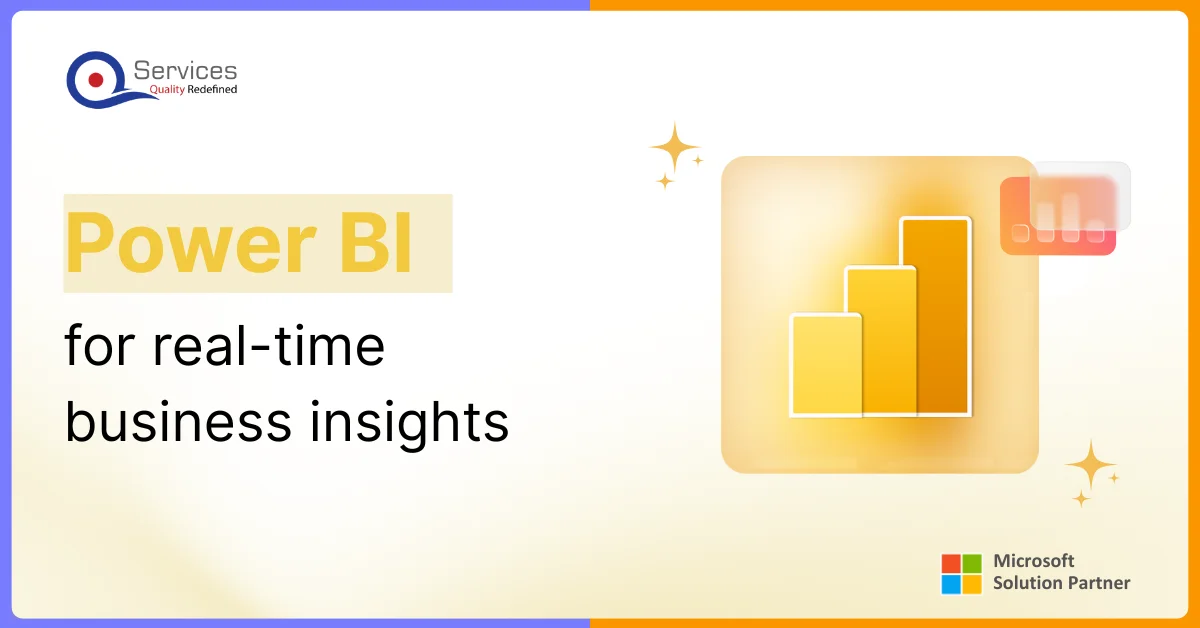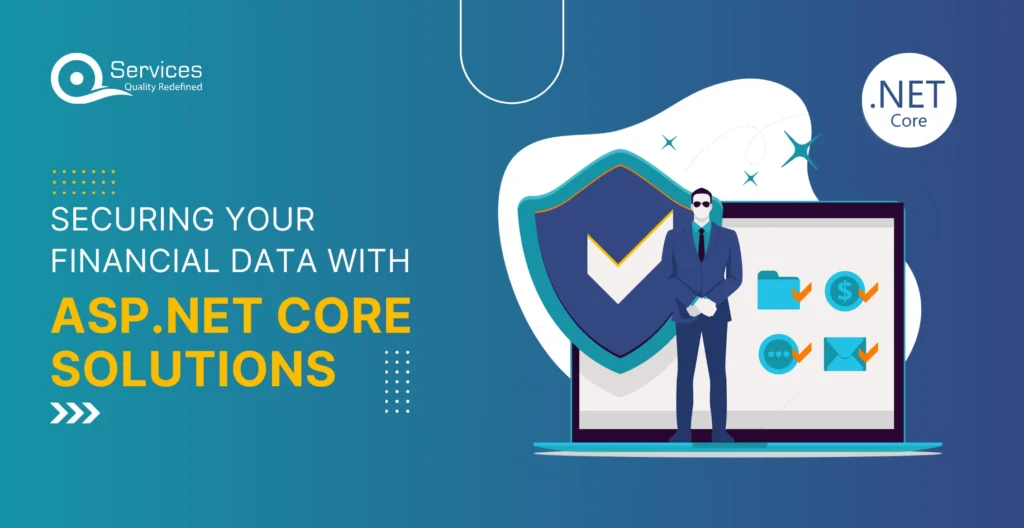
Home » Securing Your Financial Data with ASP.NET Core Solutions

Securing financial data has become vitally crucial in the current digital era. Financial institutions and banks adopted online services like internet banking quickly, but this also made them prime targets for hacking and phishing assaults. Safeguarding confidential financial data is crucial for preserving client confidence and guaranteeing smooth operations. Financial institutions need to put strong and adaptable security measures in place to counter the increasing number of cyberattacks. This would enable them to keep offering dependable and secure services while safeguarding the sensitive information their clients rely on. In this blog we will explore how businesses can secure their financial data with ASP. NET Core Solutions.
ASP .NET Core development services offer a comprehensive suite of solutions for building web applications and services using the ASP.NET Core framework. These services enable the creation of dynamic websites, RESTful APIs, and real-time chat applications, providing a solid foundation for diverse development needs.
ASP.NET is versatile in nature, allows cross-platform development, runs seamlessly on Windows, macOS, and Linux, and supports the use of various development tools across different operating systems. It also offers flexible deployment options, allowing applications to be hosted either in the cloud (such as on Azure) or on-premises, depending on business requirements. As part of the .NET ecosystem, ASP.NET Core leverages the robust, scalable, and efficient capabilities of .NET, ensuring high-quality and performant solutions.
Protecting financial data is crucial for organizations in the financial services sector, where keeping sensitive information confidential, intact, and accessible is very important. ASP.NET Core offers strong security features to enhance these efforts:
ASP.NET Core includes built-in ways to securely verify users and control who can access data, ensuring only authorized individuals can interact with sensitive information.
The framework supports strong encryption methods for data both when stored and when being sent, ensuring that customer details and transaction records stay safe from unauthorized access or changes.
ASP.NET Core helps set up security headers like Content Security Policy (CSP), which helps prevent common security issues like cross-site scripting (XSS) by specifying approved sources of content.
ASP.NET Core helps organizations follow strict rules like GDPR and PCI DSS. By adopting these secure practices, financial institutions can operate safely, protecting data from breaches while meeting legal requirements. These features highlight how ASP.NET Core supports secure and compliant operations in finance.
ASP.NET Core applications handle various types of financial data, each with unique requirements:
This encompasses personal details such as names, addresses, and contact information. It is governed by strict privacy regulations to ensure customers’ privacy and confidentiality are maintained.
These records capture financial activities, including deposits, withdrawals, and transfers. They necessitate secure storage and comprehensive auditing to guarantee accuracy and regulatory compliance.
This includes information such as account numbers, balances, and account types. Ensuring this data remains confidential and tamper-proof is essential for maintaining trust and security in financial operations.
Financial institutions commonly face several security threats:
These occur when unauthorized parties access sensitive data, often due to application vulnerabilities, server misconfigurations, or stolen credentials. ASP.NET Core emphasizes secure coding practices to help prevent such incidents.
Hackers may enter accounts or systems, particularly through weak or stolen credentials. Utilizing strong authentication methods, like multi-factor authentication, is essential to safeguard against this threat.
Cybercriminals trick users into disclosing confidential information. ASP.NET Core applications should incorporate user education on phishing dangers and employ rigorous data validation to reduce this risk.
Get free Consultation and let us know your project idea to turn into an amazing digital product.
Authentication verifies user identities by comparing credentials, such as usernames and passwords, with stored data. Authorization determines the actions users are permitted to perform within the server, database, or application.
ASP.NET Core’s Data Protection API secures sensitive data through key management and rotation, ensuring data confidentiality and integrity both at rest and in transit.
Enforcing HTTPS is crucial for secure communication. ASP.NET Core allows easy configuration of HTTPS settings, protecting data during transmission.
ASP.NET Core provides tools to guard against common vulnerabilities, including:
Cross-Platform Capabilities: ASP.NET Core operates on Windows, macOS, and Linux, allowing financial applications to be developed and deployed across various platforms for broader accessibility.
Modular Architecture: The lean and modular framework of ASP.NET Core enables efficient memory usage and faster response times. It handles high traffic and concurrent requests effectively, making it ideal for scalable financial applications.
Performance Benefits: ASP.NET Core is built for high performance, even under heavy workloads. It ensures optimal response times, which is crucial for real-time financial services.
Security and Compliance: ASP.NET Core offers a secure and compliant platform for developing core banking, trading, payments, and risk management systems. Its enhanced security features improve data protection and help prevent breaches, ensuring compliance with industry standards.
When selecting an ASP.NET Core Development Company, several critical factors should guide your decision:
The company’s proficiency in ASP.NET Core development is critical due to its advantages such as enhanced performance, cross-platform capabilities, and code reusability. Look for a company that has a proven track record of successfully delivering ASP.NET Core projects across various industries. They should have a team of developers well-versed in the latest ASP.NET Core technologies and trends, capable of leveraging these features to build scalable and high-performing applications tailored to your needs. Check for certifications, previous project successes, and their involvement in the ASP.NET Core community.
Reviewing the company’s portfolio is essential to assess their capability and suitability. Look for diversity in their projects that match your project’s complexity and scale. This includes examining whether they have experience developing applications like yours, whether it’s simple web applications or complex enterprise solutions. The portfolio should showcase their creativity, problem-solving abilities, and adherence to best practices in ASP.NET Core development.
Evaluate the company’s proficiency in the framework’s modular architecture, security features, and asynchronous programming capabilities. They should demonstrate expertise in optimizing performance, ensuring scalability, and implementing robust security measures. Look for evidence of continuous learning and improvement through certifications, training programs, and participation in relevant conferences or workshops.
The company should maintain clear and open communication channels, keeping you updated on project progress, challenges, and decisions. A dedicated project manager should facilitate regular communication, acting as your main point of contact. They should be responsive to your queries and proactive in addressing any issues that arise, fostering transparency and trust throughout the development lifecycle.
Strong project management ensures projects are delivered on time and within budget. Evaluate the company’s project management processes, including their ability to create comprehensive project plans, set clear milestones, and manage resources effectively. They should utilize modern project management tools and methodologies to track progress, identify risks early, and adjust plans as needed to maintain momentum and quality. Clear documentation and adherence to timelines are indicators of their organizational capabilities.
Reviews from previous clients offer valuable insights into the company’s reputation and reliability. Look for feedback regarding their overall experience, satisfaction with delivered solutions, adherence to timelines, and responsiveness to issues. Positive reviews indicate consistent performance and the ability to meet or exceed client expectations. Platforms such as Google Reviews, Clutch, or testimonials on the company’s website provide unbiased perspectives on their service quality and customer support.
Assess the company’s pricing structure in relation to the quality of services they offer and prevailing industry standards. They should furnish a comprehensive proposal detailing all project expenses, encompassing development, testing, deployment, and ongoing support/maintenance. Transparent pricing facilitates clarity, preventing surprises and enabling you to gauge the long-term financial impact of your collaboration. Compare proposals from several companies to ensure competitive pricing without compromising service excellence.

Financial institutions increasingly adopt cloud and edge computing for scalability and cost efficiency, but these technologies bring new cybersecurity risks such as data breaches.
AI-powered solutions enhance fraud detection, risk assessment, and customer service in finance, requiring robust security measures to protect sensitive data.
As software becomes pivotal in financial operations, secure development practices including rigorous testing and adherence to security standards are imperative.
Establishing secure digital identities and trust frameworks is essential for ensuring the security and integrity of digital transactions.
The surge in ransomware incidents targeting financial institutions underscores the need for robust cybersecurity defenses and effective incident response strategies.
Addressing vulnerabilities stemming from weak password practices through measures like multi-factor authentication and stringent password policies.
Managing security risks associated with third-party vendors through thorough assessments, contractual obligations, and ongoing monitoring.
Controlling and auditing privileged access to sensitive financial data to mitigate insider threats and unauthorized access.
Compliance with stringent data protection regulations like GDPR is critical, necessitating encryption and transparent data handling practices to safeguard customer information.
Navigating complex global regulatory environments requires collaboration with regulatory experts and leveraging technology to ensure compliance.
ASP.NET Core integrates artificial intelligence to enhance threat detection and anomaly analysis. By leveraging AI algorithms, it proactively identifies potential security threats, thereby strengthening overall cybersecurity measures.
ASP.NET Core supports strong encryption algorithms that ensure data confidentiality and integrity both when stored and in transit. This feature safeguards sensitive information from unauthorized access and ensures compliance with stringent data security standards.
Securing financial data is critical in today’s digital landscape, where financial institutions confront escalating cybersecurity threats. ASP.NET Core development services provide robust solutions for building secure applications that meet stringent regulatory requirements. They empower financial organizations to create resilient systems safeguarding sensitive information and fostering client trust.
As cybersecurity challenges evolve alongside technological advancements, financial institutions must prioritize proactive security measures and regulatory compliance. Choosing a skilled ASP.NET Core development services partner is vital for implementing effective security practices and ensuring the dependability of financial services.
For further insights into navigating financial security issues, explore our detailed exploration on “The Role of Microsoft Copilot in Financial Security.” This resource offers valuable perspectives on leveraging advanced technologies to enhance cybersecurity in finance.

Our Articles are a precise collection of research and work done throughout our projects as well as our expert Foresight for the upcoming Changes in the IT Industry. We are a premier software and mobile application development firm, catering specifically to small and medium-sized businesses (SMBs). As a Microsoft Certified company, we offer a suite of services encompassing Software and Mobile Application Development, Microsoft Azure, Dynamics 365 CRM, and Microsoft PowerAutomate. Our team, comprising 90 skilled professionals, is dedicated to driving digital and app innovation, ensuring our clients receive top-tier, tailor-made solutions that align with their unique business needs.

ASP.NET in 2026 is evolving into a cloud-native, AI-powered platform for the future of web development.
Backed by .NET 9+ and Azure, it continues to be a leading choice for secure and scalable applications.
Explore the top ASP.NET trends shaping web development in 2026, from Blazor to Minimal APIs and beyond.

In this blog, we’ll explore how AI-driven automation is reshaping banking. From boosting operational efficiency to improving compliance and risk management, we’ll look at how this technology is creating smarter, more adaptive financial systems.

In the healthcare industry, managing and securing sensitive patient data is paramount. With the increasing adoption of cloud technologies, healthcare organizations are leveraging platforms like Microsoft Azure to store, process, and analyse healthcare data. However, with this shift comes the responsibility
Built-in Authentication and Authorization: ASP.NET Core offers advanced features for secure user authentication and authorization.
Secure Data Handling: Protects against threats like SQL injection and cross-site scripting (XSS).
Cross-Site Request Forgery (CSRF) Protection: Prevents unauthorized requests from malicious websites
Ease of Configuration: Strives for zero configuration but allows specific configurations when needed (e.g., key repository).
Basic Consumer-Facing API: Provides straightforward APIs that are easy to use correctly and difficult to misuse. Developers don’t need to manage raw key material directly
ASP.NET Core Data Protection is a cryptographic API that provides key management and rotation. It ensures the authenticity, integrity, and confidentiality of trusted information, such as authentication cookies or bearer tokens.
ASP.NET Core ensures adherence to stringent security standards, safeguarding financial applications.

Founder and CEO

Chief Sales Officer
